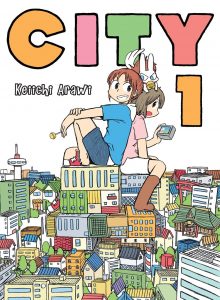JQ Magazine: Manga Review — ‘CITY’
By Rashaad Jorden (Yamagata–ken, 2008-10) for JQ magazine. A former head of the JETAA Philadelphia Sub–Chapter, Rashaad is a graduate of Leeds Beckett University with a master’s degree in responsible tourism management. For more on his life abroad and enthusiasm for taiko drumming, visit his blog at www.gettingpounded.wordpress.com.
Work often gets in the way of fun times. But if you incorporate some creativity into your life, that doesn’t have to be the case.
Enter the world of Midori Nagumo, the protagonist of the comedy manga CITY. In this first volume (which began serialization in Japan in September 2016) from creator Keiichi Arawi (Nichijou), Nagumo is a very broke college student whose landlady is constantly hounding her for money. Her roommate Niikura refuses to lend her money when she realizes what Nagumo’s true intention is.
Nagumo has to resort to other avenues to raise money, such as stealing a clay figure with the aim of selling it. But she clumsily drops the object, rendering it shattered. Crazily enough, immediately afterwards she’s offered a job at a restaurant (where the incident happens).
Our protagonist accepts the job but still has issues. It doesn’t help that her landlady has a police officer help “move” (or steal) all of her stuff so she wouldn’t escape (as the stolen items are actually collateral). In the middle of the volume, Nagumo reflects on her life, telling herself that if she could continue to have lots of happy moments, she’d be unbelievably thrilled with her life.
Even a job doesn’t prevent craziness from happening—not surprising because she complains about the struggle of wanting to do something fun. Speaking of craziness, the story concludes with Nagumo barging into the office of a magazine after Niikura mentions an issue of that magazine contains “girl power tips.”
“Chaotic” would be a fair term to describe Nagumo’s life. That word might also sum up the series in general. CITY contains its share of amusing (if not bizarre) moments, such as the landlady and Nagumo engaging in a wrestling match after the old lady accuses the young woman of not paying rent. In addition, a guy’s “lucky item” from a daily horoscope turning out to be a short skirt would classify as an oddity.
At times, reading the dialogue will leave you scratching your head because it’s uncertain where the book is taking you. There are a couple of chapters in the book when it’s rather unclear what happened (or who the subject of the dialogue is supposed to be). Even the order of the manga appearing in this volume leaves something to be desired. Nagumo’s first day on the job appears later in the book when you get the impression that she would be starting at the restaurant much sooner—after all, one of the main themes is how she plans to juggle life with a job along with the temptations of big city fun. In addition, the conclusion of the Arawi’s work will have you scratching your head. It’s quite unclear what’s happening as the thought of “that’s the end?” popped into my head upon finishing the book.
Maybe the disorder is quite fitting: Nagumo is seemingly never certain of how life will play out, so why should the book play out in an orderly fashion? If nothing else, CITY is a reminder that big city chaos can be entertaining.
For more on CITY, visit http://www.vertical-comics.com/books/city_01.php
For more JQ magazine book reviews, click here.



Comments are closed.